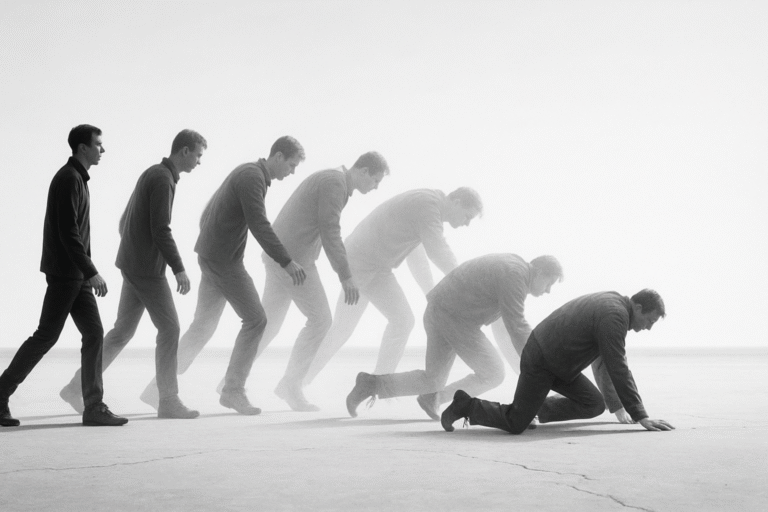
Living within the boundaries that nature makes necessary—materially, emotionally, and ethically.”
Eidoism is not only about consuming less—it is about living in a way that does not exceed what the Earth, the body, or others can carry. It calls for a life of structural balance: taking only what can be renewed, speaking only what holds, and relating in ways that do not extract. Fairness, restraint, and mutual respect are not ideals—they are requirements for anything sustainable.
At its core, Eidoism asks one quiet question:
What is truly necessary, and what is inherited noise?
It is a way of stepping out of habits that overshoot the capacities of the body, the mind, or the earth. It doesn’t demand sacrifice. It demands clarity.
Eidoism is not against growth—but it only trusts growth that fits. Growth that doesn’t require denial, illusion, or constant output. It builds only what can be sustained in the long term—without collapse, burnout, or dependency.
You are in a loop.
1.
The Growth Illusion
Human beings carry an inherited evolutionary drive toward expansion—originally tied to survival, adaptation, and reproduction. Over time, this drive has been scaled into ideology. Nearly all economic systems—capitalist, socialist, or authoritarian—have built themselves around growth as necessity. Progress is marketed as peace, stability, and prosperity. But in truth, it has become a mask: a mechanism for accumulating capital at the top while masking structural inequality and ecological overshoot.
2.
Consuming the Foundations of Life
Modern societies no longer live on the interest of nature—they consume its capital. Forests, soils, oceans, and climate systems are being depleted faster than they can regenerate. This is not development. It is extraction without return. High consumption, required to sustain economic growth, accelerates ecological breakdown and deepens social imbalance. What is called “progress” is often the concentration of wealth among oligarchs, while the majority is kept in a cycle of dependency—just high enough to consume, just low enough to remain controlled.
3.
Collapse Repeats Where Growth Goes Unchecked
History is filled with civilizations that collapsed under the weight of their own expansion: Rome, Mesopotamia, the Mayans, the Khmer Empire, Ancient Egypt. Not because of invasion alone, but because they exceeded what life could sustain—overusing land, labor, and time. Today, we are repeating the same pattern. The modern world is caught in a new progress trap: motion mistaken for meaning, growth mistaken for value, and collapse continuing under the illusion of advancement.
4.
Eidoism: The Quiet Withdrawal from Collapse
Eidoism does not offer revolution. History shows that revolutions only replace the surface while the behavioral loop remains unchanged—ambition, domination, and overconsumption simply return under new names.
Instead, Eidoism offers withdrawal—from the myth of progress, from the fantasy of endless growth, and from the compulsions that drive us beyond what life can hold. It is not an ideology of restriction. It is a return to structural clarity: to live only within what nature, the body, and society can truly sustain.
Not to abandon life, but to remain part of it.
What To Change
Living Within Limits
Nature Makes the Boundaries
Why It Matters
What This Looks Like in Practice
How To Use
It is not a rule but a structure
Can people See the Loop?
Yes—but only partially.
The loop is already operating in childhood: the child acts, gets approval, adapts. They learn what is accepted, admired, or avoided—long before they understand the words for it. But to consciously see the loop—to realize that their desire for love, beauty, and meaning may be structured by a hidden need to be seen—requires a level of detachment.
Is the Loop is Necessary?
Yes. The recognition loop serves a function in youth:
It builds identity through mirroring.
It motivates action, connection, and ambition.
It stabilizes emotion by offering social grounding.
Even the illusion of romantic love, the “you complete me” fantasy, is structurally useful in the developmental arc of the psyche. It leads the young person to form bonds, take risks, and experience intensity.
What Happens If You Remove the Loop?
It can collapse meaning. Suddenly, love, purpose, and identity seem like tricks.
It can trigger nihilism. If everything is performance, why care at all?
It can create a false ego-detachment. A teenager may pretend to be above recognition while secretly needing it more than ever.
You cannot rip the veil. You can only place cracks in it—small, quiet observations that prepare them to see later.
Let Them Live—But Show the Structure
Let people live. Let them try, fail, reach, burn, become.
Eidoism is not there to block the loop. It is there to illuminate it when the loop starts to consume them.
Not to take away the magic of recognition — But to give it back in a form that can last.
Does Eidoism has Responsibiliies?
Yes. Eidoism must not attack beliefs, creativity, or any dream. It must protect those things by restoring their source.
When a person is ready—when they begin to suffer under the demands of being seen, of being enough, of being admired—Eidoism offers not destruction, but relief:
You are not broken. – You are just caught in a loop that once served you.
Teach By Exposure, Not Explanation
If you tell somebody “You are seeking recognition,” they will resist, deny, or mimic your words without understanding. But if you design learning moments where the absence of recognition is felt—not punished—they begin to see the loop themselves.
Anonymous feedback systems.
Group work where no one is named for success or failure.
Creative tasks where no evaluation is given—only reflection.
Learn Structure Without Reward
In daily live create systems that work, not ones that impress.
Ask:
Does this hold?
Does this do what it says?
Would this still matter if no one saw it?
Buy by Structure, Not Signal
Eidoism asks you to choose products based on what they do, not what they represent.
Most consumption today is driven by identity, status, or recognition—not need.
Before buying, ask:
Do I really need this?
Does it do exactly what it claims—nothing more, nothing less?
Would I still buy it if no one saw it and it carried no brand?
Now Exit the Loop
Exiting the loop won’t happen all at once. You’ll try—and fail. You’ll catch yourself too late, after the post, the comment, the purchase, the need to be seen. That’s normal. Every failed attempt makes the loop more visible. And the more clearly you see it, the more power it loses. One day, without planning it, you’ll pause—just before acting—and choose differently.
When that happens, let it be quiet. Don’t explain it, don’t reward it, don’t make it special. Just stay still. That small act—unseen, unshared—is your first real exit. The loop only survives when you feed it. Without your reaction, it collapses. That’s where Eidoism begins. Not with a statement, but with silence.
You will fail. You will repeat.
And then—quietly—walk on.


